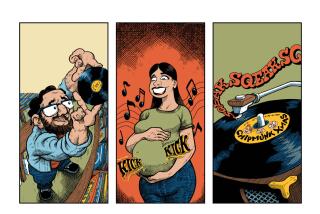BONUS PUTS THE ONUS ON VINYL LPS
- Share via
All records aren’t created equal.
Case in point: Lionel Richie’s “Dancing on the Ceiling” album, due in stores next week.
If you buy the cassette or compact disc version instead of the traditional vinyl LP, you’ll get a double bonus: longer renditions of two songs, plus an extra song that isn’t on the vinyl.
There’s even more to gain in selecting the cassette or CD version of Amy Grant’s just-released greatest hits album, “The Collection.” The LP contains 10 songs but the cassette has 15 and the CD a whopping 17.
Even that isn’t the most extreme example of “bonus songs,” a practice that affects only a small percentage of all releases but has become more widespread recently.
The cassette of the Cure’s new “Standing on a Beach” album contains twice as much music as the LP--even though they both carry an $8.98 suggested list price. The entire second side of the cassette is devoted to 12 songs not on the LP.
That’s great if you have a CD player or cassette deck, but what about consumers who want to stick with LPs?
Several key record company executives have started asking just that question. Their conclusion: LP buyers are beginning to feel shortchanged and manipulated. The result may be a pronounced cutback in the use of bonus songs.
“We don’t think the LP buyer should be put at a disadvantage,” said Al Teller, president of CBS Records Division. “We have to be sensitive to all our consumers. We’d like to offer the consumer the full product in whatever format he chooses. The use of bonus songs as an attempt to stimulate sales of one (music) carrier versus another isn’t something we’re encouraging.”
Henry Droz, president of WEA, which owns and distributes the Warner Bros., Elektra and Atlantic labels, agreed: “We have deep reservations about shortchanging the LP buyer. We’ve done very little of it, and I don’t know that we intend to do any more.”
David Steffen, A&M; Records vice president of sales, was even more emphatic. “There are still 100 million homes that are turntable-equipped,” he noted. “It seems silly to penalize one consumer while you give additional value to another.”
Some local record retailers suggest that public relations may not be the only reason for the change of heart. They believe that manufacturers may be nervous about the rapid decline in the percentage of the market held by vinyl albums. Industry estimates hold that only 25% of the money now spent on prerecorded music goes to LPs.
“The reason labels started putting bonus songs on cassettes and CDs in the first place was to steer the customer toward those two formats,” said Dennis Wingett, Southern California area manager for the 33-store Licorice Pizza chain. “I think it’s a little ironic that they now want to steer customers away from them. It worked too well, I guess.
“I think record companies are concerned about the decline of LP sales and are looking for any possible reason to explain why sales might be declining. The industry doesn’t want to admit that customers just aren’t buying LPs as they used to.”
There are practical considerations behind the practice of adding extra songs to cassettes and CDs. Those two formats can accommodate about 70 minutes of music with no loss in sound quality. But the sound quality of an LP starts to deteriorate after about 40 minutes, most experts agree.
A&M;’s Steffen noted that the only way to add more music to the vinyl LP is to make the album a two-record set. And that’s expensive. “Going to a second record means you virtually double your manufacturing costs,” he said.
Bonus songs are usually added because artists want to take advantage of the extra playing time on CDs or cassettes and give buyers of those formats more value for their money. But some consumers suspect it’s a ploy by record companies to make hard-core fans buy more than one configuration.
Whether that’s the intent, that’s often the end result. Kip Brown, manager of Moby Disc, a Sherman Oaks record store that caters to a hip pop-rock clientele, said that many die-hard Cure fans have bought the group’s new album in all three formats.
Brown added that his customers probably would welcome the elimination of bonus tracks because “it would save them having to make a big decision every time they went in to buy an album.”
The bonus-songs practice does have some industry supporters. Among them is Mike Bone, senior vice president of marketing for Elektra Records, which has bonus songs on current albums by the Call and Howard Jones.
“I wouldn’t advocate including them on every release,” Bone said, “but if an artist wants to do it and there’s extra room, I don’t see anything wrong with it. In fact, I think there’s some benefit for everyone.”
Even for LP buyers? “In the case of the Cure and Howard Jones, I don’t think there would be that many fans without access to a cassette machine,” said Bone. “Both acts appeal to an upscale new music crowd, and they’d have tape decks.”
Robbin Ahrold, RCA Records vice president of communications, recalled how the practice of adding bonus songs to CDs began.
“It was done very casually,” he said. “You’d get together with an artist and everybody would be bubbling with enthusiasm for what you could do with this shiny new platter. Now that CDs are in the mainstream, we’re starting to take a less casual approach to it.”
More to Read
The biggest entertainment stories
Get our big stories about Hollywood, film, television, music, arts, culture and more right in your inbox as soon as they publish.
You may occasionally receive promotional content from the Los Angeles Times.










